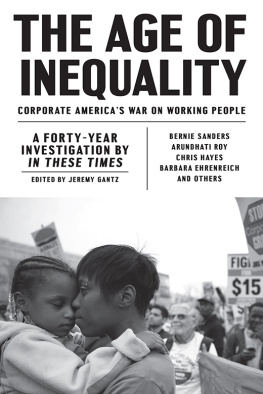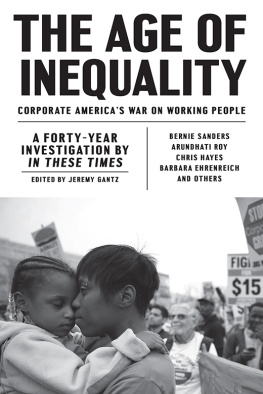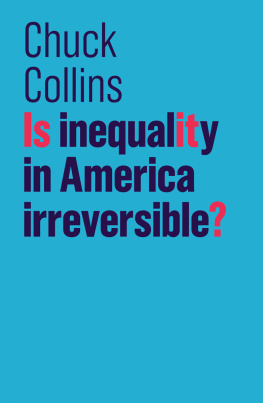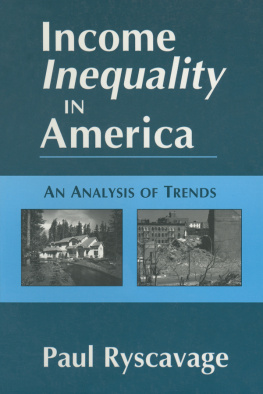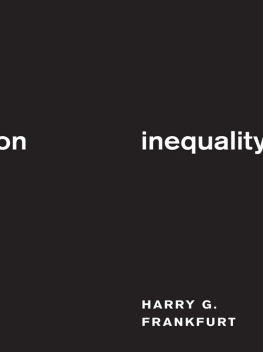This book started as an idea I proposed to In These Times editor and publisher Joel Bleifuss during an issue release party in January 2015. That he immediately expressed interest and subsequently allowed me to pass forty years of archives through the filter of my own interests is a testament to his generous spirit.
One of the most satisfying things about editing this book has been how the process reconnected me to In These Times, where I once worked as associate editor. Exploring the archives in depth confirmed what I had long assumed: the magazines coverage was unusually perceptive (and prescient) from the beginning, and money to keep the enterprise going has always been scarce. Seeing founder James Weinsteins full-throated fundraising appeals in so much faded newsprint reminded me that In These Times has always been more of a mission than a business. Its relative longevitymost political magazines dont make it to middle ageis proof of its uniquely valuable role on the American Left.
Despite many hours reading the archives, editing this book has hardly been a solitary experience. Many thanks to Diana Finch, In These Times book agent, for helping me turn my ideas into a coherent proposal and then, of course, finding a publisher. Thanks to Rebecca Burns, Micah Uetricht, and especially In These Times executive editor Jessica Stites for helping to improve the books structure, suggesting pieces to include and never ignoring my various requests. Thanks to the other In These Times staff members who provided input and feedback: Christopher Hass, Miles Kampf-Lassin, and Ketseeyah Yosef. And thanks to Andy Hsiao at Verso for gently telling me what was missing.
Many thanks to all the In These Times interns who collectively helped gather the archival material: Princess-India Alexander, Parker Asmann, Jennifer Ball, Caroline Beck, Tom Burnett, Julia Clark-Riddell, Marc Daalder, Lauren Gaynor, Karen Gwee, Lorenzo Gudino, Rachelle Hampton, Colin Hanner, Dayton Martindale (now an assistant editor at the magazine), Eli Massey, Regina Tanner, and Katie Way. And thanks to Ron Unz, who generously digitized most of the magazine archives back in 2005.
To all of the magazines writers, whether in this book or not: thank you for telling stories that matter.
Finally, to Caitlin. Your unwavering support (often in the form of solo parenting) throughout this books long gestation leaves me without words.
Happy fortieth anniversary, In These Times.
Inequality is timeless; the danger it poses to any society varies by degree. The title of this book therefore could, I suppose, refer to almost any period of time. A central tension courses throughout the history of the United States, between the promise of equal opportunitywe were all created equal, right?and the reality of inequality. The great struggles of U.S. history, from the Civil War to the civil rights movement, have at their core been fights over the gap between this promise and reality.
Yet since the late 1970s, as the economy globalized and the rich grew much richer, this gap has widened dramatically. More and more Americans admit this and are refusing to tolerate growing divides as the inevitable cost of globalization. But thirty-five years before the Occupy movement drew the publics attention to a broken system, and forty years before presidential candidates across the political spectrum acknowledged inequality as a problem, In These Times was on the case. Launching an independent socialist weekly, founding editor and publisher James Weinstein looked forward to covering a growing left movement buoyed by the election of Jimmy Carter. Instead, his magazine would chronicle a faltering movement, a newly conservative political era, and the emergence of the countrys new gilded age. With a mission to expose the struggles of the powerless, In These Times was well positioned to report on a government and economy more and more tilted toward the powerful.
U.S. incomes began growing more unequal in 1979, and money has been flowing upward ever since. Fast-forward nearly forty years, and:
The richest 1 percent of Americans now own more wealth than the bottom 90 percent.
The richest .01 percent of Americans controls 22 percent of the wealth, up from 7 percent in the late 1970s.
The countrys median household income (adjusted for inflation) is less today than it was in 1989.
More and more Americans are aware of the wealth disparity that now characterizes the country. But while these numbers make clear who has been winning the class waras Warren Buffet has said, its his sidethey dont show us how inequality grew since the 1970s and what it felt like to be left behind. They dont show us the lives of striking workers permanently replaced by union-busting companies. They dont show us fast-food workers impoverished by a stagnant minimum wage or the migrant farm laborers making less than that wage. They dont show us the army of permatemps and independent contractors that corporations have raised to avoid providing the benefits that middle-class Americans once expected as their birthright.
Many books about the growth of inequality illuminate the problem through historical data and research. This book takes a different approach, collecting In These Times articles from the last forty years to show why the country became so unequal so quicklyand how people pushed back against this trend. Think of it as a real-time narrative of a still-unfolding man-made disaster: a history of the present. In the introductions to each chapter, longtime contributors and current editors reflect on the view from 2017.
captures what all this has meant for many U.S. workers: precarity.
In Search of Solidarity, Christopher Hayes interlude following , we focus on those who have pushed for changestruggles that In These Times has reported from the front lines, providing an inside take on movements as they unfolded.
Intensifying globalization has both undermined and heightened the power of borders, sparking transnational solidarity and protest. focuses on movements and political campaigns that have challenged our unequal order since the recent financial crash exposed the economy for what it is: broken. From Occupy to Black Lives Matter to Bernie Sanders, radical change is starting to look more attractive to many.

